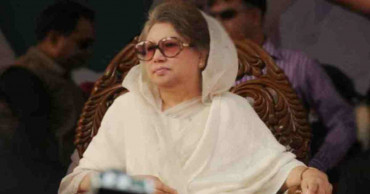health risk
Dhaka’s air world’s worst this morning
Dhaka, the overcrowded capital city of Bangladesh, has topped on the list of cities with the worst air quality with an AQI score of 171 at 9:05am this morning (March 5, 2025).
Today’s air was classified as ‘unhealthy’, referring to a health threat to residents, according to the AQI index.
When the AQI value for particle pollution is between 50 and 100, air quality is considered ‘moderate’, usually sensitive individuals should consider limiting prolonged outdoor exertion, between 101 and 150, air quality is considered ‘unhealthy for sensitive groups’, between 150 and 200 is ‘unhealthy’, between 201 and 300 is said to be 'very unhealthy', while a reading of 301+ is considered 'hazardous', posing serious health risks to residents.
China’s Beijing, Uganda’s Kampala and Thailand’s Chiang Mai cities respectively occupied the second, third and fourth spots on the list, with AQI scores of 167, 161 and 160 respectively.
The AQI, an index for reporting daily air quality, informs people how clean or polluted the air of a certain city is and what associated health effects might be a concern for them.
Dhaka’s air ‘unhealthy’ Tuesday morning
The AQI in Bangladesh is based on five pollutants: particulate matter (PM10 and PM2.5), NO2, CO, SO2, and ozone.
Dhaka has long been grappling with air pollution issues. Its air quality usually turns unhealthy in winter and improves during the monsoon.
As per World Health Organization (WHO), air pollution kills an estimated seven million people worldwide every year, mainly due to increased mortality from stroke, heart disease, chronic obstructive pulmonary disease, lung cancer, and acute respiratory infections.
11 months ago
Dhaka’s worst air affliction continues
Dhaka, the overcrowded capital city of Bangladesh, has again ranked the first on the list of cities with the worst air quality with an AQI score of 219 at 8:50am this morning (February 20, 2025).
Today’s air was classified as 'very unhealthy’, referring to a grave health threat to residents, according to the AQI index.
The air continued to be the world's worst for the second consecutive day on Thursday, the last working day of the week.
When the AQI value for particle pollution is between 50 and 100, air quality is considered ‘moderate’, usually sensitive individuals should consider limiting prolonged outdoor exertion, between 101 and 150, air quality is considered ‘unhealthy for sensitive groups’, between 150 and 200 is ‘unhealthy’, between 201 and 300 is said to be 'very unhealthy', while a reading of 301+ is considered 'hazardous', posing serious health risks to residents.
Uganda’s Kampala, China’s Wuhan and Vietnam’s Hanoi cities respectively occupied the second, third and fourth spots on the list, with AQI scores of 1681, 168 and 167 respectively.
The AQI, an index for reporting daily air quality, informs people how clean or polluted the air of a certain city is and what associated health effects might be a concern for them.
Dhaka’s air quality turns ‘unhealthy’ this morning
The AQI in Bangladesh is based on five pollutants: particulate matter (PM10 and PM2.5), NO2, CO, SO2, and ozone.
Dhaka has long been grappling with air pollution issues. Its air quality usually turns unhealthy in winter and improves during the monsoon.
As per World Health Organization (WHO), air pollution kills an estimated seven million people worldwide every year, mainly due to increased mortality from stroke, heart disease, chronic obstructive pulmonary disease, lung cancer, and acute respiratory infections.
1 year ago
Relentless assault on hearing: Dhaka’s noise pollution out of control, say experts
Noise pollution levels in Dhaka city are reaching alarming heights, severely impacting the daily lives of its residents. Increasing traffic, unnecessary honking, rampant use of loudspeakers, and other sources of high-decibel noise are disrupting the capital’s normalcy. Despite existing laws, there is a notable lack of effective enforcement.
Residents across Dhaka are facing significant health risks due to excessive noise. Many are experiencing hearing loss, with school and university students among the most affected. Children, the elderly, and patients are particularly vulnerable, with traffic police also unable to escape the noise onslaught.
Experts highlight that public awareness about the dangers of noise pollution remains low. Prof Ahmad Kamruzzaman Majumder of Stamford University’s Environmental Science Department pointed out, “Unnecessary honking, loudspeakers, and construction noise are making daily life unbearable. This issue is not just about physical health; it also affects mental well-being and even hampers urban plant reproduction and crop yields.”
Prof Majumder added that controlling rampant horn usage alone could reduce Dhaka’s noise pollution by 60%. However, poor law enforcement in this regard hinder progress. “We have laws, but their implementation is almost non-existent. For instance, the Noise Pollution Control Rules 2006 mandate quiet zones around schools, hospitals, and mosques, but these are rarely enforced.”
Motorists to be trained to control noise pollution: Environment Minister
Health professionals are raising alarms about the long-term impacts of noise pollution. Prof Dr Abul Bashar Mohammad Khurshid Alam, Director General (DG), Directorate General of Health Services (DGHS), explained, “Noise levels in Dhaka are more than double the acceptable limits, leading to serious physical and mental health issues. Beyond hearing loss, there is an increase in diabetes and heart complications. Pregnant women, children, and the elderly are particularly at risk. Exposure to noise levels of 120 decibels can cause immediate hearing damage, while consistent exposure to 85 decibels for two hours daily can gradually deteriorate hearing.”
Experts emphasize the need for long-term planning and stricter enforcement of existing laws. “Countries with advanced noise control measures impose fines for unnecessary horn usage. We need similar robust enforcement here,” Prof Majumder urged. He also called for increased public awareness and adherence to noise control measures, including avoiding unnecessary use of headphones.
The Center for Atmospheric Pollution Studies (CAPS) at Stamford University conducted a year-long study from April 2021 to March 2022, examining noise levels at ten locations in Dhaka. The research revealed that noise exceeded acceptable limits in all surveyed areas. Specifically, 96.7% of the time in quiet zones, 91.2% in residential areas, 83.2% in mixed-use areas, 61% in commercial areas, and 18.2% in industrial areas, the noise levels surpassed the standard thresholds.
Noise pollution awareness campaign: One-minute silence to be observed in Dhaka Oct 15
CAPS’s findings underscore the pervasive nature of noise pollution in Dhaka, with 82% of all monitored locations exceeding 60 decibels consistently. Despite the Noise Pollution Control Rules 2006, which set permissible noise levels at 45 decibels at night and 55 during the day for residential areas, and 60 decibels at night and 70 during the day for commercial areas, enforcement remains a significant challenge.
The situation in Dhaka demands immediate and comprehensive action. Strengthening legal frameworks, enhancing public awareness, and enforcing noise control measures are critical steps toward mitigating the city’s noise pollution crisis. Without decisive action, the health and well-being of Dhaka’s residents will continue to deteriorate under the relentless assault of noise pollution.
Urban noise pollution, wildfires among biggest emerging environmental threats: UN
1 year ago
Khulna City Corporation lacks capacity to manage e-waste, resulting in health risks
Every day, hundreds of kilograms of electronic waste or e-waste are collected in Khulna city but the city corporation does not have the capacity to manage this waste. As a result, health risks are increasing.
Abandoned TVs, refrigerators, computers, laptops, cameras, air conditioners, microwaves, CFL lights, washing machines, mobile phones, DVD players, electronic toys, among others, are the main sources of e-waste, city officials said.
When these items are discarded, they turn into “e-waste”. Even if the materials are destroyed, they do not decompose; they cause damage to the environment.
According to Khulna City Corporation (KCC), about 1,000 tons of waste is produced in the city every day. Of this, KCC waste management department workers collect 800 tons and dump those at Rajbandh and Shalua dumping grounds. The remaining 200 tons of waste make their way into drains or canals.
Read More: E-waste management should be safe and environmentally friendly: Nasrul Hamid
KCC Chief Waste Management Officer Engr Md Abdul Aziz said the city produces close to one ton of e-waste every day. Like household waste, these too go into the dumping grounds. A large number of electrical equipment, including TV and computer parts, coming from the drain gather at the Rupsha Switch Gate area. Those are also collected and dumped at Rajbandh.
Md Kabir has been involved in the scrap material business for about 15 years. He said earlier there were more TVs, electricity meters, batteries, water motors. In the last seven-eight years, the sale of different types of mobile phones and small motors has increased.
“The products are removed, cleaned, and put up for sale. No one ever talked about using protective gear,” he said.
Dulal buys products from houses in different areas of the city and sells them in Sheikhpara. He said many buy broken items and repair them. The rest is sold as scrap.
Read More: E-Waste Crisis: Effects of Electronic Waste on Environment and Human Health
“I burn wire and take out the copper, and throw out the rest. I’ve developed rashes in my hands while doing this work,” he said.
Professor Dr Abdullah Harun Chowdhury, head of the Department of Environmental Sciences of Khulna University, said e-waste contains various types of toxic compounds including lead, cadmium, mercury. These are harmful to the environment and animals.
In addition, mercury enters the environment and human body through various processes. It can damage the brain, reduce hearing and immunity. Lead from e-waste causes serious damage to the nervous system of newborns, he added.
KCC Chief Waste Management Officer Md Abdul Aziz said a master plan on waste management at the city corporation is underway.
Read More: Soaring e-waste affecting health of millions of children: WHO
Besides, a modern waste treatment plant has been constructed in Shalua. All types of waste will be segregated and distributed there. Once the project is completed, e-waste will come under the purview of the project, he said.
2 years ago
16 more dengue patients hospitalised in 24 hours: DGHS
Bangladesh confirmed 16 more dengue cases in 24 hours till Wednesday morning.
All the new patients were detected in Dhaka, according to the Directorate General of Health Services (DGHS).
Seventy-three dengue patients, including 69 in the capital, are now receiving treatment at different hospitals across the country.
This year, the DGHS has recorded 479 dengue cases and 406 recoveries so far. The authority has not yet reported any death from the mosquito-borne viral disease.
Dengue – a leading cause of serious illness and death in some Asian and Latin American countries – was first reported in Bangladesh in 2000 and claimed 93 lives. In three years, the fatality number almost fell to zero.
However, 105 dengue patients, including 95 in Dhaka division, died in 2021.
Dengue is found in tropical and sub-tropical climates worldwide, mostly in urban and semi-urban areas.
About 4 billion people, almost half of the world's population, live in areas with a risk of dengue, according to the US Centers for Disease Control and Prevention (CDC).
Each year, up to 400 million people get infected with dengue while approximately 100 million get sick from infection, and 40,000 die from severe dengue, it says.
Read: 13 more dengue cases reported
Because there are four different dengue viruses, a person can be infected by the virus up to four times in their life. The symptoms include nausea, vomiting, aches and pains and a rash.
"There is no specific treatment for dengue or severe dengue. Early detection of disease progression associated with severe dengue, and access to proper medical care lowers fatality rates of severe dengue to below 1 percent," according to the World Health Organization.
3 years ago
Govt urged to raise prices of low-tier cigarettes to reduce health risk
Speakers at a seminar have proposed for raising the price of low-tier cigarettes to discourage smoking as well as minimize health risks.
If the prices of cigarettes are raised, it will boost revenue generation of the government as well, they said.
They came up with the suggestions at the seminar organized jointly by Dhaka Ahsania Mission and the Economic Reporters’ Forum (ERF) titled “Tobacco Price and Tax” held at the ERF auditorium in the city on Saturday.
Presided over by ERF President Sharmeen Rinvy, its general secretary SM Rashidul Islam, Dhaka Ahsania Mission deputy director Mokhlesur Rahman, CTFK Grants manager Abdus Salam Mia spoke, among others, on the occasion.
The speakers said although the low-tier cigarettes occupy almost 75 percent of the whole industry, but its price remained unchanged over the last two years. As a result, the number of smokers at this level is not declining.
Also read: E-cigarettes turn many young people into smokers: expert
Director (research) of Unnayan Shamannay Abdullah Nadvy made the key-note presentation.
The speakers said that the price of cigarettes at the low-tier has remained unchanged over the last two years.
They suggested that the price of cigarettes should be increased considering the rise in per capita income and inflation.
They said there is no alternative to raising the price of tobacco products to turn Bangladesh as a tobacco-free country by 2041.
Nadvi in his key-note presentation said that the current duty structure of cigarettes is complex and it should be more simplified.
He proposed for raising the price of every cigarette packet of 10 sticks at the low-tier to Taka 50 from the existing Tk 39 while in the mid-tier, the price of cigarette packets should be raised Taka 75 from Taka 63. Side by side, Nadvy suggested for raising the price of cigarettes at the high-tier specifically.
“If this proposal is implemented, the revenue of the government will be boosted while the number of smokers will be reduced by 13 lakh. Besides, some 9 lakh youths will be discouraged to continue smoking.” he added.
Also read: Hike in tobacco prices demanded to curtail harm
In his welcome address, deputy director of Dhaka Ahsania Mission Mokhlesur Rahman said that the government has already announced to turn Bangladesh as a smoking- free country by 2041 and to materialize this, there is no alternative to raising the duty on cigarettes and tobacco products.
CTFK Grants manager Abdus Salama Mia said that it is very much necessary to control the use of tobacco in turning Bangladesh as a developed country. “This will not only help alleviating poverty, but also reduce the cost of the government in addressing the tobacco related diseases.”
ERF general secretary SM Rashidul Islam said that the government is in dilemma over tobacco as it wants to control tobacco at one hand, and the government also depends on tobacco products for boosting revenue on the other hand.
“But, in order to reduce the number of smokers, the price of cigarettes at the low-tier should be increased as around 75% smokers consume cigarettes at the low-tier.” he added.
3 years ago
Bill passed to ensure safe child daycare centres
Parliament on Wednesday passed the Child Daycare Centre Bill 2021, seeking to support the children of professionals and working women as the number of nuclear families is increasing day by day.
State Minister for Women and Children Affairs Fazilatun Nesa placed the Bill in the House and it was passed by voice vote.
Read: Child Daycare Centre Bill 2021 placed in Parliament
According to the proposed law, there will be four types of child daycare centres in the country -- Child daycare centres to be run with government subsidy; daycare centres to be run by the government any government agency, directorate, department, statutory agency or autonomous agency to provide free services; daycare centres to eb run by individuals or organisations for commercial purposes; and non-profitable daycare centre to be run by any individual, organisation, non-government organisation, club, association, corporate sector or industrial sector.
The Women and Children Affairs Ministry will monitor the daycare centres.
4 years ago
Khaleda still at risk, needs treatment abroad: Fakhrul
BNP Chairperson Khaleda Zia needs treatment at any advanced hospital abroad as she is at health risk due to her acute heart and kidney problems, BNP Secretary General Mirza Fakhrul Islam Alamgir said on Friday.
"There are some fundamental issues over her illness that are alarming. She has acute heart and kidney problems. The medical board is concerned about these problems,” he said.
Read: Khaleda still in vulnerable condition: Fakhrul
Speaking at a press conference at BNP Chairperson’s Gulshan office, Fakhrul said it seems the hospitals and advanced centres in Bangladesh are not enough for her treatment.
“Experts have repeatedly been saying that she (Khaleda) needs advanced treatment and it is now important to send her to any advanced centre for proper treatment of her illnesses. We’ve also been talking about it repeatedly,” he said.
Replying to a question whether Khaleda Zia will go to court for bail under the current condition of her health, the BNP leader apparently answered in the negative, "I replied to such a question in the past. Unfortunately, we suffered the biggest loss in the court over the legal and political matters.”
Read: Khaleda taken back to cabin from CCU
Fakhrul said it is the court that annulled the caretaker government system. “It’s the court that also has done serious injustice to Khaleda Zia. She can’t be convicted by any law in any way.”
He said they will have to take a decision on moving court very carefully since they are not confident about getting justice.
The 76-year-old BNP chief, who tested positive for Covid-19 on April 11, was admitted to Evercare Hospital on April 27.
On April 28, a 10-member medical board, headed by Prof Shahabuddin Talukder, was formed for the treatment of Khaleda at the Evercare Hospital a day after her admission there.
Read: Govt not allowing Khaleda to go abroad: Fakhrul
She tested negative for Covid-19 on May 8, 27 days after she had been infected with the deadly virus, but the BNP chief is still suffering from various complications.
Amid the coronavirus outbreak, the government freed Khaleda Zia from jail for six months through an executive order suspending her sentences on March 25 last year.
4 years ago
Dhaka’s air quality ‘hazardous’
Dhaka, one the most polluted cities in the world, ranked worst in the Air Quality Index (AQI) on Monday morning.
5 years ago
Less screen-time reduces health risk: Study
The risk of being caught by diseases like cancer is relatively lower among those who spend two hours or less time keeping eyes on screens.
5 years ago








.jpg)







